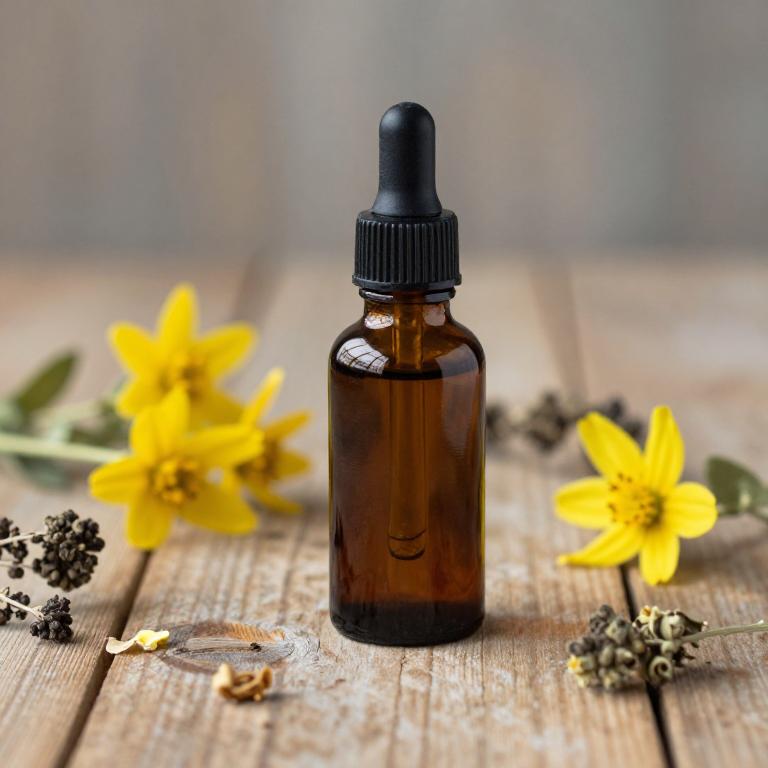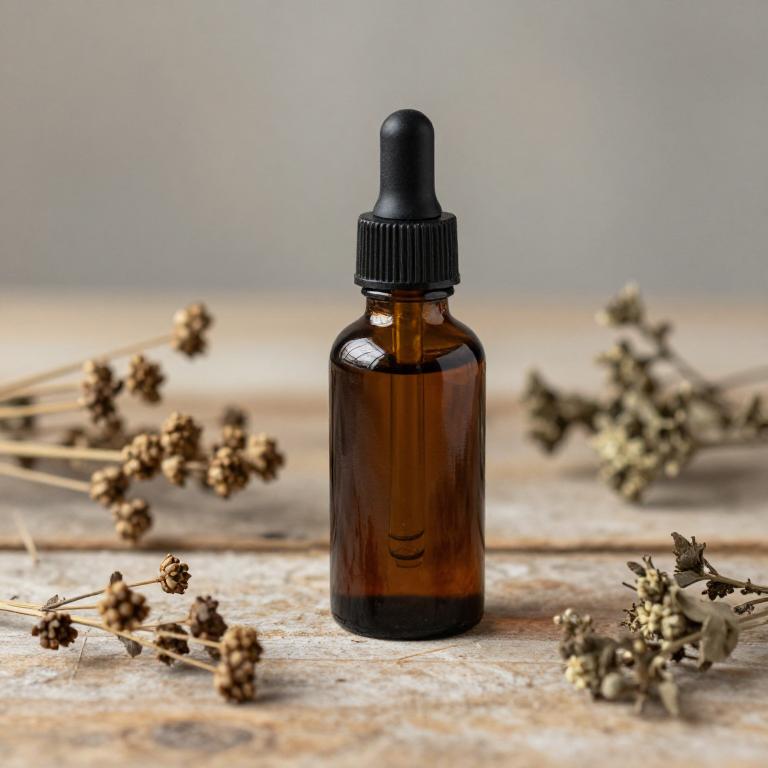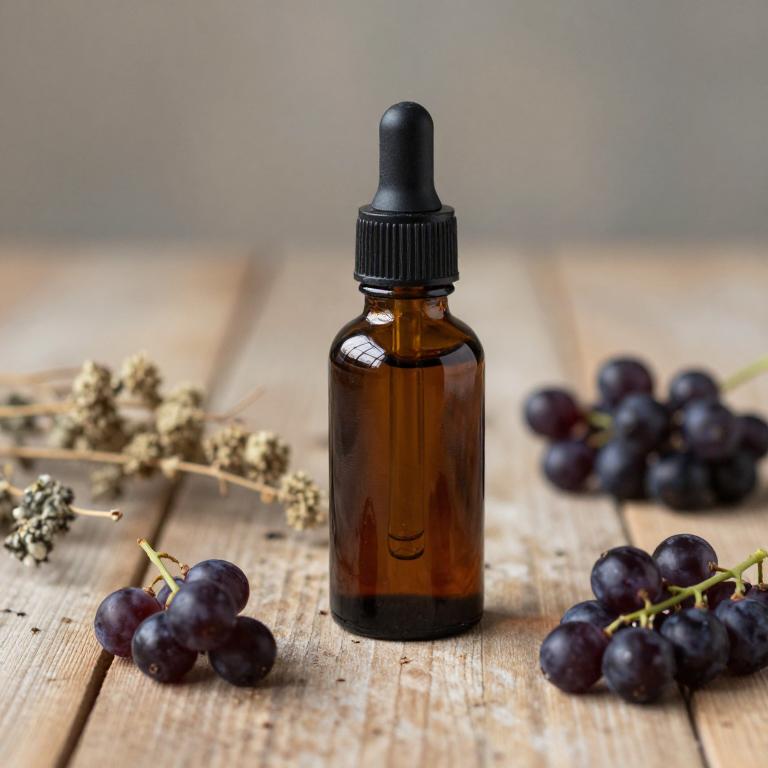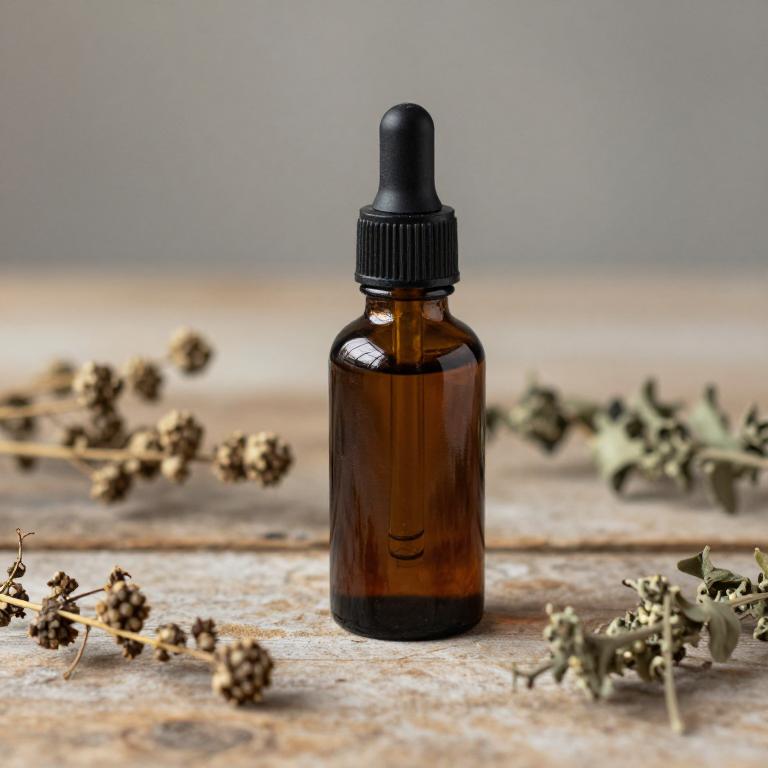10 Best Herbal Tinctures For Muscle Pain

Herbal tinctures for muscle pain are concentrated liquid extracts made by soaking herbs in alcohol or glycerin, which allows for the extraction of active compounds that can help reduce inflammation and relieve soreness.
Commonly used herbs include willow bark, ginger, turmeric, and echinacea, each known for their anti-inflammatory and analgesic properties. These tinctures are often preferred for their ease of use and ability to be customized to individual needs, as they can be diluted with water or applied topically. They are generally considered safe when used as directed, though some people may experience mild side effects such as stomach upset.
Overall, herbal tinctures offer a natural alternative to conventional pain relief methods, supporting muscle recovery and comfort.
Table of Contents
- 1. Mountain arnica (Arnica montana)
- 2. St. john's wort (Hypericum perforatum)
- 3. Ginger (Zingiber officinale)
- 4. Field horsetail (Equisetum arvense)
- 5. Common grape (Vitis vinifera)
- 6. Common mallow (Symphytum officinale)
- 7. Salvia (Salvia officinalis)
- 8. Blessed thistle (Cnicus benedictus)
- 9. Yarrow (Achillea millefolium)
- 10. Chaste tree (Vitex agnus-castus)
1. Mountain arnica (Arnica montana)

Arnica montana herbal tinctures are commonly used to alleviate muscle pain and inflammation due to their potent anti-inflammatory and analgesic properties.
These tinctures are typically made by soaking the dried roots and rhizomes of the plant in alcohol, creating a concentrated extract that can be applied topically. They are often used for conditions such as muscle strains, bruises, and joint pain, as they help reduce swelling and promote healing. However, arnica should not be ingested as it can be toxic when taken internally, and it should be avoided during pregnancy or by individuals with sensitive skin.
When used correctly, arnica montana tinctures can be an effective natural remedy for localized muscle pain and discomfort.
2. St. john's wort (Hypericum perforatum)

Hypericum perforatum, commonly known as St. John's Wort, is a herbal plant that has been traditionally used for its potential therapeutic effects, including the relief of muscle pain.
When prepared as a tincture, it is typically made by soaking the dried plant material in alcohol, allowing the active compounds, such as hypericin and hyperforin, to be extracted. These compounds are believed to possess anti-inflammatory and analgesic properties that may help reduce pain and inflammation in muscle tissues. While some studies suggest that St. John's Wort may offer mild pain relief, it is important to note that its effectiveness for muscle pain is not as well-established as for other conditions like depression.
As with any herbal remedy, it is advisable to consult with a healthcare professional before using hypericum perforatum tinctures, especially if you are taking other medications, due to potential interactions.
3. Ginger (Zingiber officinale)

Zingiber officinale, commonly known as ginger, has been traditionally used for its anti-inflammatory and analgesic properties, making it a popular ingredient in herbal tinctures for muscle pain.
These tinctures are typically prepared by soaking freshly grated ginger in alcohol, allowing the active compounds such as gingerol and shogaol to infuse into the solution. The warming effect of ginger tinctures helps to improve blood circulation and reduce stiffness in muscles, providing natural relief from soreness and inflammation. Many individuals find these tinctures to be a gentle and effective alternative to over-the-counter pain medications, especially for chronic conditions like arthritis or post-exercise muscle aches.
When used consistently, ginger tinctures may support long-term muscle health and reduce the frequency of pain episodes.
4. Field horsetail (Equisetum arvense)

Equisetum arvense, commonly known as field horsetail, is a traditional herbal plant that has been used for centuries to create tinctures for muscle pain relief.
These tinctures are typically prepared by soaking the dried plant material in alcohol, allowing the active compounds to be extracted over time. The key constituents of equisetum arvense, such as silica, flavonoids, and various minerals, are believed to contribute to its anti-inflammatory and analgesic properties. When applied topically, these tinctures may help reduce swelling, ease muscle soreness, and promote tissue repair.
However, it is important to consult a healthcare professional before use, as some individuals may experience allergic reactions or interactions with other medications.
5. Common grape (Vitis vinifera)

Vitis vinifera, commonly known as the grapevine, has been traditionally used in herbal medicine for its potential anti-inflammatory and analgesic properties.
Herbal tinctures made from Vitis vinifera are often prepared using the leaves, berries, or seeds, and are believed to support muscle pain relief by reducing inflammation and promoting circulation. These tinctures are typically taken orally or applied topically, depending on the formulation and intended use. The active compounds, such as resveratrol and flavonoids, are thought to contribute to their muscle-relieving effects.
While more research is needed, some individuals use Vitis vinifera tinctures as a natural alternative to conventional pain management options.
6. Common mallow (Symphytum officinale)

Symphytum officinale, commonly known as comfrey, is a traditional herbal remedy that has been used for centuries to alleviate muscle pain and promote tissue repair.
Its active compounds, such as allantoin and rosin, are believed to stimulate cell growth and reduce inflammation, making it effective for musculoskeletal injuries. Symphytum officinale herbal tinctures are typically prepared by soaking the dried roots in alcohol, allowing the beneficial compounds to be extracted for medicinal use. These tinctures are often applied topically to bruises, sprains, and strains to ease pain and accelerate healing.
However, due to the potential risk of liver toxicity, it is important to consult a healthcare professional before using comfrey tinctures, especially for prolonged periods.
7. Salvia (Salvia officinalis)

Salvia officinalis, commonly known as sage, is a medicinal herb that has been used for centuries to address various health concerns, including muscle pain.
Its essential oils, particularly thujone and camphor, are believed to have analgesic and anti-inflammatory properties that can help relieve muscle aches and discomfort. Salvia officinalis herbal tinctures are typically made by extracting the plant's active compounds using alcohol, creating a concentrated form that can be applied topically or taken internally under professional guidance. These tinctures are often used in aromatherapy and topical applications to reduce inflammation and ease tension in sore muscles.
While generally considered safe, it is important to consult a healthcare provider before using sage tinctures, especially for individuals with specific health conditions or those taking medications.
8. Blessed thistle (Cnicus benedictus)

Cnicus benedictus, also known as St. Benedict's thistle, is a traditional herbal remedy used for its potential anti-inflammatory and analgesic properties.
Herbal tinctures made from Cnicus benedictus are often utilized to alleviate muscle pain and inflammation due to their high concentration of bioactive compounds such as flavonoids and sesquiterpene lactones. These tinctures are typically prepared by soaking the dried plant material in alcohol to extract the active components, making them easy to administer in small doses. While some studies suggest that Cnicus benedictus may have mild pain-relieving effects, it is important to consult a healthcare professional before use, especially for those with existing medical conditions or taking other medications.
As with any herbal remedy, the effectiveness and safety of Cnicus benedictus tinctures can vary, and more research is needed to fully understand its therapeutic potential.
9. Yarrow (Achillea millefolium)

Achillea millefolium, commonly known as yarrow, has been traditionally used for its anti-inflammatory and analgesic properties, making it a popular choice for herbal tinctures aimed at alleviating muscle pain.
The active compounds in yarrow, such as flavonoids and sesquiterpene lactones, contribute to its ability to reduce inflammation and soothe muscle discomfort. When prepared as a tincture, achillea millefolium can be applied topically or taken internally, depending on the formulation and recommended usage. It is often used to address conditions like muscle strains, sprains, and general muscular soreness.
However, it is important to consult a healthcare professional before use, especially for individuals with allergies or those taking other medications.
10. Chaste tree (Vitex agnus-castus)

Vitex agnus-castus, commonly known as chasteberry, is traditionally used in herbal medicine for its potential to support hormonal balance and alleviate symptoms related to menstrual discomfort.
While it is more widely recognized for its effects on women's health, some studies suggest that its anti-inflammatory and analgesic properties may offer relief for muscle pain. Herbal tinctures made from Vitex agnus-castus are often used as a natural alternative to conventional pain relievers, though their effectiveness for muscle pain can vary among individuals. These tinctures are typically taken orally and may be combined with other herbs to enhance their therapeutic benefits.
As with any herbal remedy, it is important to consult a healthcare professional before use, especially for those with existing medical conditions or taking other medications.